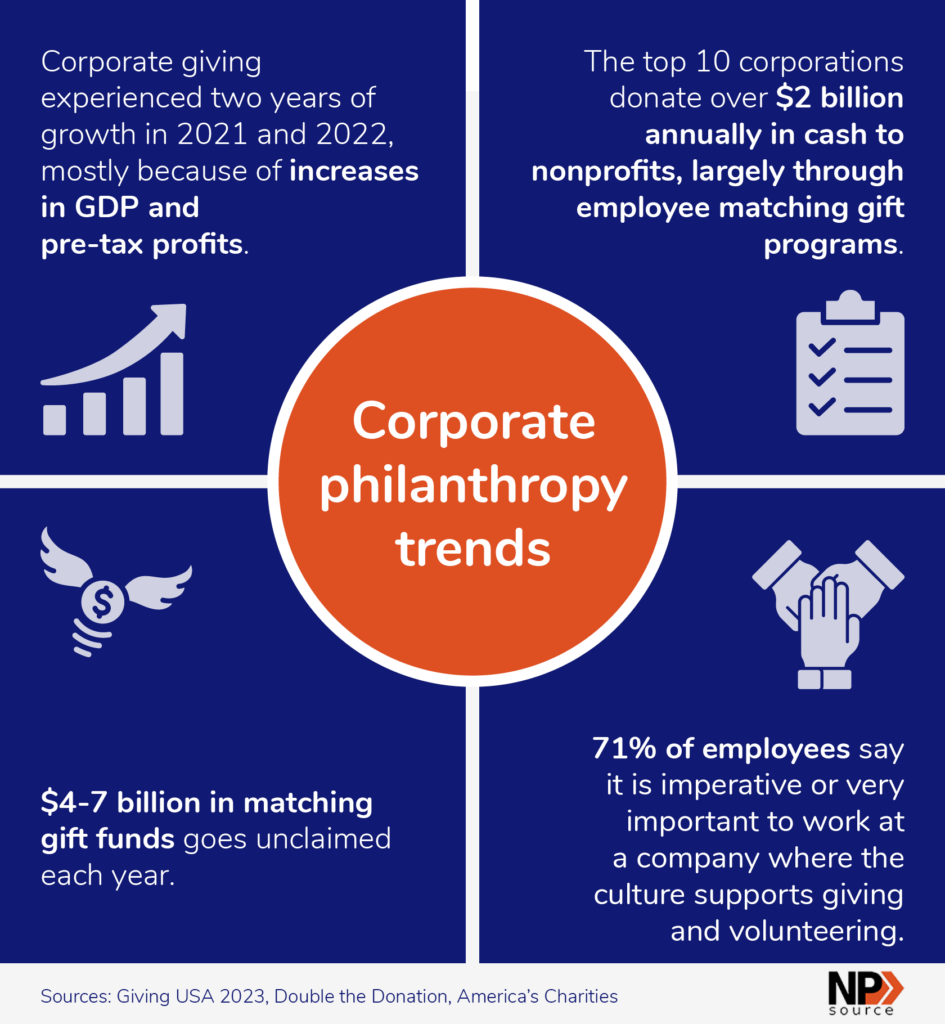The Function of Business Philanthropy in Fostering Sustainable Organization Practices
Company philanthropy has emerged as a critical method for organizations intending to incorporate sustainability right into their procedures. By straightening company objectives with environmental and social efforts, organizations can promote healthier ecological communities. This approach not just enhances corporate reputation but also strengthens stakeholder relationships. The real degree of its effect on long-term company success remains to be explored. What innovative techniques are being taken on because of this?
Comprehending Company Philanthropy and Its Importance
Corporate philanthropy functions as an essential device where organizations can add to societal wellness while improving their own track records. This technique entails companies allocating sources, such as funds, time, or proficiency, to support area efforts, philanthropic reasons, or social programs. By participating in humanitarian efforts, business can resolve pressing social issues, such as education and learning, health care, and environmental issues, consequently playing a pivotal duty in fostering favorable change.
Moreover, corporate philanthropy can improve employee morale and draw in skill, as people significantly look for to help socially accountable organizations. It can also enhance customer loyalty, as customers choose brand names that demonstrate a dedication to making a difference. Eventually, understanding the value of company philanthropy lies in identifying its dual benefits: improving community welfare while all at once enhancing service reliability and reliability in the eyes of stakeholders. This alignment of social obligation with industrial passions underscores its importance in today's business landscape.
The Link In Between Company Philanthropy and Sustainability
While many companies participate in philanthropy to improve their public photo, a much deeper link exists between corporate philanthropy and sustainability. Corporate philanthropy typically straightens with lasting techniques by sustaining campaigns that address environmental and social difficulties. When services buy neighborhood jobs, eco-friendly power, or curricula, they add to a much healthier ecological community and culture. This dedication not just promotes goodwill however also strengthens stakeholder relationships, boosting brand name commitment.

Case Researches: Successful Corporate Philanthropy Initiatives
Countless business have effectively integrated kind efforts into their service techniques, showing the concrete advantages of such commitments. Microsoft has actually launched many programs, such as its AI for Earth effort, which supports environmental sustainability via innovation. This strategy not only help conservation initiatives however additionally improves Microsoft's online reputation as a leader in business duty.
Likewise, Unilever's Lasting Living Plan highlights environmental and social influence, aligning its philanthropy with service goals. By moneying projects that enhance health and hygiene, Unilever reinforces its brand while adding to international health.
One more significant instance is Patagonia, which vows 1% of sales to environmental causes. This commitment resonates with customers, cultivating commitment and driving sales.
These case studies highlight that efficient business philanthropy can produce economic returns while advertising lasting practices, reinforcing the idea that honest service methods are valuable for both society and bottom lines.
Building Stronger Stakeholder Relationships Through Philanthropy
Philanthropy functions as an important tool for business seeking to strengthen their relationships with stakeholders, as it fosters count on and demonstrates a commitment to social responsibility. By taking part in charitable initiatives, organizations can get in touch with local communities, boosting their online reputation and motivating stakeholder commitment. This involvement commonly causes significant interactions, producing a sense of common worths between the company and its stakeholders.
Furthermore, philanthropic initiatives can resolve certain neighborhood needs, allowing companies to add favorably to social challenges. This involvement not only showcases a firm's honest stance yet likewise helps in bring in and maintaining customers that prioritize social responsibility.
In addition, workers frequently really feel a lot more motivated and involved when they see their organization proactively taking part in kind activities, leading to an extra productive office culture. Subsequently, business philanthropy comes to be a calculated avenue for developing more powerful, a lot more resistant connections with varied stakeholder groups.
Gauging the Impact of Business Philanthropy on Organization Success
The link between corporate philanthropy and stakeholder interaction establishes the phase for evaluating its basics impact on general service success. Organizations often measure this impact with different metrics, consisting of brand name online reputation, employee complete satisfaction, and client loyalty. Philanthropic efforts can improve a business's picture, promoting trust fund amongst customers and capitalists alike. Additionally, involved workers have a tendency to show higher spirits and performance, directly associating to improved business efficiency.
Measurable analysis can also be employed, with companies examining monetary returns against philanthropic expenditures. Study suggests that business with strong kind dedications commonly experience higher stock efficiency and minimized volatility. Additionally, qualitative assessments, such as stakeholder responses, can supply insights right into neighborhood understandings and long-term relational advantages.
Eventually, measuring the influence of business philanthropy requires a complex method, integrating both measurable and qualitative information to ensure a comprehensive understanding of its impact on service success. corporate philanthropy.
Frequently Asked Inquiries
How Can Tiny Services Engage in Company Philanthropy Efficiently?

What Prevail False Impressions Regarding Corporate Philanthropy?

How Does Company Philanthropy Impact Employee Spirits?
Corporate philanthropy favorably affects employee spirits by fostering a feeling of function, enhancing task complete satisfaction, and advertising loyalty. Employees commonly feel visit the site extra engaged and encouraged when their business adds to social causes, developing a helpful job atmosphere.
What Are the Tax Obligation Benefits of Company Philanthropy for Companies?
Company philanthropy provides substantial tax advantages for businesses, including reductions on charitable contributions and possible reductions in gross income. These incentives urge companies to engage in social campaigns while simultaneously improving their economic standing.
How Can Business Pick Effective Philanthropic Partners?
Firms can pick effective humanitarian companions by evaluating positioning with their worths, determining impact capacity, taking a look at economic transparency, and promoting solid interaction. This critical approach enhances partnership and warranties common advantages for both parties involved.
Corporate philanthropy serves as a necessary device via which businesses can contribute to societal well-being while enhancing their own track records - corporate philanthropy. Eventually, recognizing the relevance of company philanthropy exists in identifying its twin advantages: improving area well-being while at the same time improving company integrity and dependability in the eyes of stakeholders. While several firms involve in philanthropy to improve their public picture, a deeper link exists in between company philanthropy and sustainability. The link in between business philanthropy and stakeholder interaction sets the stage for evaluating its influence on total service success. Business philanthropy provides significant tax obligation benefits for companies, including reductions on philanthropic contributions and potential decreases in taxable income